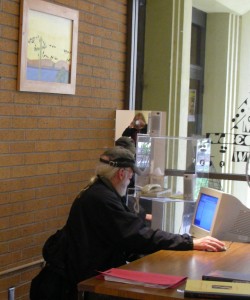Curation: “the activities of sorting, choosing, and display, which museum curators perform based on their extensive knowledge of the subject area of an exhibit.” [according to Mindy McAdams in her article on Curation and Journalists]
“With the push of social media and advancements in communications technology, the curator has become a journalist by proxy.
“They are not on the front lines, covering a particular beat or industry, or filing a story themselves, but they are responding to a reader need.
“With a torrent of content emanating from innumerable sources (blogs, mainstream media, social networks), a vacuum has been created between reporter and reader — or information gatherer and information seeker — where having a trusted human editor to help sort out all this information has become as necessary as those who file the initial report.” [3 quotes from Mashable article: Why Curation is Important to the Future of Journalism]
“A curator is someone who acts as a medium between journalists/publications and readers. In today’s world of social media, link aggregators and social networking, almost anyone can attempt to be a curator . . . Curation is still evolving and the rules on the playing field will certainly change as the medium continues to be shaped. Starting with some solid rules, however, instead of adopting an ‘anything goes’ approach, is definitely a good start.” [source]
The Mashable article quoted above also lists these thoughts:
- Curators are like tour guides.
- The word “media” means in the middle and reporters have always been mediaries — or middlemen.
- Curators need to be trustworthy — and, thus, need to be held to standards, i.e., that is ethical practices as taught to journalists.
- Transparency is key, so sources must be cited when content is not original.
Some suggest that the Internet-era newsroom should split journalism into four roles: (a) reporters; (b) columnists; (c) curators; (d) editors [source]. But reporters so often do not go out to do first-person reporting; instead of creating their own content, they simply reword what comes across wire copy. In addition many news organizations look down on curators, considering them as less-than-journalists.
But are they? Are curators “less than” or simply the — New Journalists?
STUDENTS: What have I done here?
I have “curated,” i.e. collected a lot of material about one topic. Or have I merely “aggregated” it. What is the difference?
I agree with many [here is one example] who insist that curation requires more than social sharing; rather the true curator adds value by offering knowledgeable analysis.
Here is some analysis:
1) Business, whether it be the news distribution business or a brand supplier or a service provider, must accept the fact that the world has changed, and that the “audience” is smarter and requires speedy, accurate, non-manipulative information.
2) Basically what this means is that old “traditional” business practices need to be re-examined to incorporate new technological opportunities.
3) Creativity and “non-laziness” [e.g.. simply relying on copying others] must be a part of building a community of followers and advocates.
So what does this “analysis” have to do with the Future of Journalism? You tell me.
